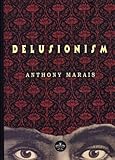 Delusionism by Anthony Marais
Delusionism by Anthony MaraisMy review
rating: 3 of 5 stars
In "Delusionism", Anthony Marais presents roughly sixty-nine micro-essays, whose two sections (Culture vs. Nature and Art vs. Life) are divided by a hundred aphorisms. This is a forked-tongue-in-cheek exploration and oration, marketed as philosophy/self help--somewhat in the vein of Bierce's "Devil's Dictionary", but intending more to drive thought through humor than humor through thought.
The book is filled with thoughts--and thoughts about thoughts--and I was tempted to refer to its points heavily in this review. I was, in retrospect, surprised to not find an essay on Conversation or Discussion, though it's likely there was a fitting aphorism I'm not recalling. Regarding Genius, Marais says:
Has the reader ever noticed that thinking is easy? For most of us it's more difficult not to think than the contrary. It seems that with every turn of the head our brain showers us with thoughts, flashing across our mind's sky like fireworks. Indeed, the rush of ideas is a delightful feeling. Sometimes it seems to palpably flow through our body in a euphoric, almost tickling sensation. Interestingly, it's often ideas we perceive as untruths that tickles us most: absurd, ridiculous thoughts that produce outrageous images. People who, with a haphazard turn of the head, stumble upon these thoughts sometimes find themselves giggling aloud in public, or walking with a silly, conspicuous skip. This is genius: the ability to produce freely and easily new thoughts. And the sensation is pleasurable.
It is genius, this genius, that Marais seems to strive for with this book; and from how often I laughed along, I think he often hit his mark. With a wink and a nudge, he delivers essays on topics ranging from Originality and The Quest For Happiness to Pet Rocks and Books vs. Movies. Some play straight, some verso--and others strive for double duty, contradicting not only convention, but, subtly perhaps, themselves as well.
Of course, some insights are more clever than others--some are obvious, some simply plain, and some a bit muddled. But the overall attempt, I think, makes a very worthwhile platter of intellectual finger food that could well be grown into a banquet given the right crowd. I found myself half wanting to keep notes as I read, to argue back with the author and see where more thoughts led--so perhaps this is a book better read with a friend. But I suspect the author would be pleased even with my reaction to those essays I was not moved by, or felt were less than a hundred percent presented: I thought.
If this sounds interesting, you might also consider our review of The Cure, a novel by Anthony Marais.
View all my reviews.













1 comment:
TO ENTER TO WIN OUR COPY, TELL US--an uncommon quote in comments at http://www.gudmagazine.com/review/archive/2008/12/15/delusionism-by-anthony-marais/#comments. If you make it a perverse one we'll count it as a second entry. Entries will be considered through Monday, January 5, 2009 (midnight, pacific time). Open to anyone in the US/Canada.
If you duplicate someone else's quote, yours won't be counted.
Post a Comment